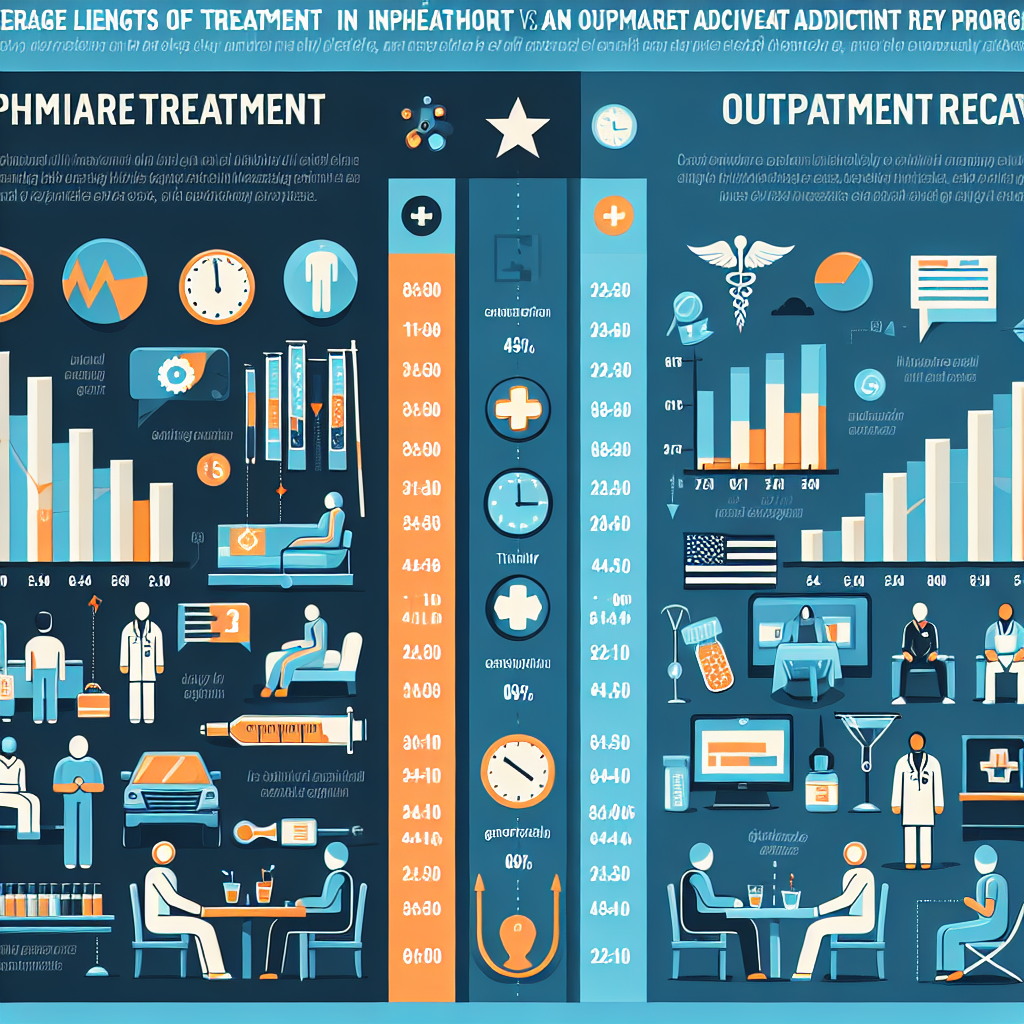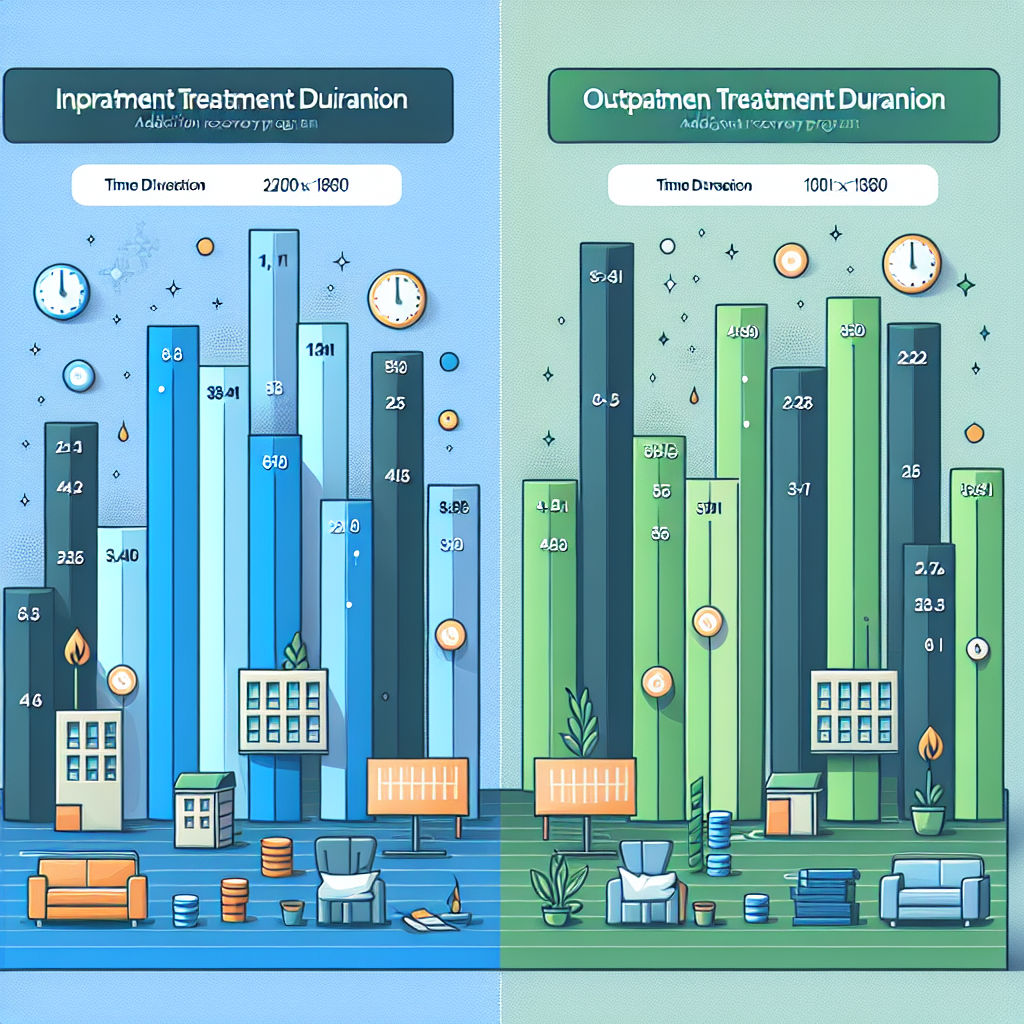-
Table of Contents

“Navigating Recovery: Inpatient Treatment Offers Intensive, Short-Term Care, While Outpatient Programs Provide Extended, Flexible Support.”
Introduction
The duration of treatment in addiction recovery varies significantly between inpatient and outpatient programs due to the differing structures and intensities of care provided. Inpatient treatment, also known as residential treatment, typically involves a more immersive and intensive approach, requiring individuals to stay at a treatment facility for a period that can range from 28 days to several months. This setting provides a controlled environment with 24/7 medical and therapeutic support, which is crucial for individuals with severe addictions or those who need a stable environment to avoid relapse. On the other hand, outpatient treatment allows individuals to live at home and maintain their daily responsibilities while attending scheduled therapy sessions and medical appointments. The duration of outpatient programs can be more flexible, often extending from several months to over a year, depending on the individual’s progress and specific needs. This approach is generally suited for those with milder addictions or those who have already completed an inpatient program and require ongoing support. The choice between inpatient and outpatient treatment is influenced by the severity of the addiction, the individual’s personal circumstances, and the level of support they need to achieve and maintain sobriety.
Comparing Treatment Durations: Inpatient vs. Outpatient Addiction Recovery
When it comes to addiction recovery, the duration of treatment can significantly differ between inpatient and outpatient programs. Understanding these differences is crucial for individuals seeking the most effective path to sobriety. Inpatient treatment, often referred to as residential treatment, involves the individual staying at a facility for a specified period. This immersive environment provides a structured and supportive setting, which can be particularly beneficial for those with severe addictions or co-occurring mental health disorders. Typically, inpatient programs last anywhere from 28 days to six months, depending on the severity of the addiction and the individual’s progress. The extended duration allows for intensive therapy, medical supervision, and a break from the triggers and stressors of daily life.
On the other hand, outpatient treatment offers a more flexible approach, allowing individuals to live at home while attending scheduled therapy sessions and support groups. This type of program is ideal for those with milder addictions or those who have already completed an inpatient program and are transitioning back to everyday life. Outpatient programs can vary widely in duration, ranging from a few weeks to several months or even years. The flexibility of outpatient treatment means that individuals can continue to work, attend school, and fulfill family obligations while receiving the support they need to maintain sobriety.
One of the key factors influencing the duration of treatment in both inpatient and outpatient settings is the individual’s unique needs and circumstances. For instance, someone with a long history of substance abuse and multiple relapses may require a more extended period of inpatient care to address underlying issues and develop coping strategies. Conversely, someone with a strong support system at home and a shorter history of addiction might find that a shorter outpatient program is sufficient to achieve lasting recovery.
Another important consideration is the level of support and accountability provided by each type of program. Inpatient treatment offers 24/7 supervision and a highly structured environment, which can be particularly beneficial for those who struggle with self-discipline or have a high risk of relapse. The constant support and accountability can help individuals stay focused on their recovery goals and make significant progress in a relatively short period. In contrast, outpatient treatment requires a higher level of self-motivation and discipline, as individuals must balance their recovery efforts with the demands of daily life. However, the ongoing support from therapists and peers in outpatient programs can help individuals build resilience and develop the skills needed to maintain sobriety in the long term.
Ultimately, the choice between inpatient and outpatient treatment depends on various factors, including the severity of the addiction, the presence of co-occurring mental health disorders, and the individual’s personal preferences and circumstances. Both types of programs have their unique advantages and can be highly effective in helping individuals achieve and maintain sobriety. The key is to find the right fit for each person’s needs and to remain committed to the recovery process, regardless of the duration of treatment.
In conclusion, while the duration of treatment for inpatient and outpatient addiction recovery can differ significantly, both approaches offer valuable support and resources for individuals seeking to overcome addiction. By understanding the differences and carefully considering one’s unique needs and circumstances, individuals can make informed decisions about their treatment options and take meaningful steps toward a healthier, sober future.
Factors Influencing Treatment Length in Inpatient and Outpatient Addiction Programs
The duration of treatment in addiction recovery programs can vary significantly between inpatient and outpatient settings, influenced by a multitude of factors that cater to the unique needs of each individual. Understanding these factors can help individuals and their families make informed decisions about the most appropriate path to recovery.
Inpatient addiction programs, often referred to as residential treatment, typically require individuals to live at the treatment facility for a specified period. This immersive environment provides a structured and supportive setting, which can be crucial for those with severe addiction issues or co-occurring mental health disorders. The length of stay in inpatient programs can range from 28 days to several months, depending on the severity of the addiction, the presence of any co-occurring disorders, and the individual’s progress in treatment. The comprehensive nature of inpatient care, which includes 24/7 medical supervision, intensive therapy sessions, and a focus on building life skills, often necessitates a longer duration to ensure a solid foundation for recovery.
Conversely, outpatient addiction programs offer a more flexible approach, allowing individuals to live at home while attending treatment sessions. This flexibility can be particularly beneficial for those who have work, school, or family commitments that they cannot abandon. Outpatient programs vary widely in intensity and duration, from a few hours a week to several hours a day. Factors influencing the length of outpatient treatment include the individual’s level of addiction, their support system at home, and their ability to maintain sobriety in a less controlled environment. While some may find success in a few months, others may require ongoing support for a year or more.
One of the primary factors influencing the duration of treatment in both settings is the severity of the addiction. Individuals with long-term or severe substance use disorders often need more time to address the underlying issues contributing to their addiction. Inpatient programs can provide the intensive care needed to stabilize these individuals and help them develop coping strategies. On the other hand, those with less severe addictions or who have already completed an inpatient program may find that outpatient treatment offers the continued support they need without the need for a prolonged stay.
Another critical factor is the presence of co-occurring mental health disorders. Many individuals struggling with addiction also face challenges such as depression, anxiety, or trauma. Inpatient programs are well-equipped to address these dual diagnoses through integrated treatment plans that include both addiction therapy and mental health care. The complexity of treating co-occurring disorders often requires a longer duration of inpatient care to ensure that both issues are adequately addressed. Outpatient programs can also provide support for co-occurring disorders, but the treatment may be spread out over a longer period to accommodate the individual’s schedule and ongoing responsibilities.
The individual’s progress in treatment is also a significant determinant of the duration. In both inpatient and outpatient settings, treatment plans are often tailored to the individual’s needs and adjusted based on their progress. Regular assessments help determine whether the individual is ready to transition to a less intensive level of care or if they need additional time to achieve their recovery goals. This personalized approach ensures that individuals receive the appropriate level of support for as long as necessary.
Ultimately, the duration of treatment in inpatient and outpatient addiction programs is influenced by a combination of factors, including the severity of the addiction, the presence of co-occurring disorders, and the individual’s progress in treatment. By understanding these factors, individuals and their families can make informed decisions about the best path to recovery, fostering hope and inspiration for a healthier, substance-free future.
Q&A
1. Inpatient addiction recovery typically involves a more intensive and structured treatment program that lasts from 28 days to 6 months, depending on the severity of the addiction and the individual’s progress.
2. Outpatient addiction recovery programs are generally less intensive and can last from several months to over a year, allowing individuals to maintain their daily responsibilities while attending scheduled treatment sessions.
Conclusion
The duration of treatment in inpatient addiction recovery is typically longer and more intensive, often ranging from 28 days to several months, as it involves 24/7 care and a structured environment. In contrast, outpatient addiction recovery usually spans a longer period but with less intensive, part-time treatment sessions, allowing individuals to maintain their daily responsibilities while receiving care.



